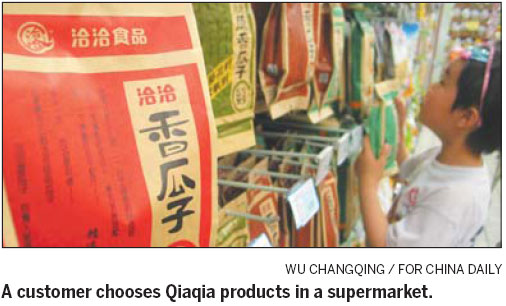
After seven years of legal wrangling, Qiaqia Food Co recently won back the rights to its English-language trademark from a German company that had been squatting on it, according to People's Daily Online.
The German Federal Supreme Court upheld the second judgment ordering OKAI, a local food trading company, to cancel its registration of Qiaqia's Chacheer trademark and logo and return the rights to the Chinese company.
A well-known domestic producer of seeds and nuts, Qiaqia is the latest Chinese enterprise to prevail against OKAI for trademark squatting. It comes on the heels of previous successful suits by Wangzhihe, a bean curd producer, and Baijia, an instant noodle manufacturer.
As a leading company in the field, Qiaqia has witnessed significant growth in its overseas markets since 2001.
As part of its expansion strategy, the company has also focused on intellectual property protection by registering its English trademark and logo in many countries and regions.
At the end of 2006, the company made an unsuccessful attempt to register the Chacheer trademark and logo in Germany. OKAI had already done so in 2005.
OKAI was once a retailer of Qiaqia products in markets outside of China.
Because Germany is a member of the European Union, Qiaqia was shut out of selling products under its brand in all the EU member countries.
It was definitely a severe shock to the company's overseas business, the company's senior manager said.
Qiaqia then contacted the German company as soon as possible in an effort to solve the problem through negotiations.
OKAI responded that it could transfer the trademark to Qiaqia but asked for an assignment fee of up to 18,000 euros ($23,400).
Qiaqia refused, calling the move "extortion", said Li Huifen, deputy general manager of the company.
After fruitless negotiations, Qiaqia filed a lawsuit with the Munich District Court in Germany in 2010.
Li said that the court dismissed its suit in the first trial, ruling that it did not constitute an act of unfair competition. The court did recognize that OKAI had engaged in trademark squatting.
In the second trial, Qiaqia persuaded the court by quoting the relevant provisions from the country's Unfair Competition Law. It also provided documents showing the company was in the process of expanding in the European markets and how lacking control of its trademark was an obstacle.
Industry insiders say it is not rare for famous Chinese brands to be rush registered by other foreign companies in an attempt to head off their entry into new markets. They called on governments and companies to set up early-warning mechanisms about trademarks and intellectual property.
haonan@chinadaily.com.cn
(China Daily 06/05/2013 page28)

